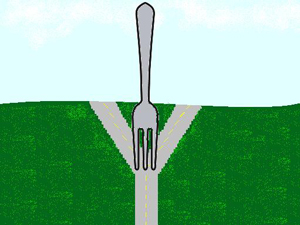
Source: Dinner Fork in the Road, ONUnicorn, Wikimedia Commons
Sometimes when you are reading, you come across a word that you think you know, but it doesn’t make any sense in this context. That’s because many words have more than one meaning. Often, it’s the most frequently used words that have more than one meaning. Common words such as “ball,” “drill,” and “pop” have multiple meanings. These multiple meanings provide the foundation for jokes known as puns.
Cinderella was thrown off the basketball team because she ran away from the ball.
I’ve been to the dentist several times so I know the drill.
After the class trip to the Dr. Pepper bottling plant, we had a pop quiz.
Another example of a word with multiple meanings can be found in this tale:
Presently the horse came to him on Monday morning, with a saddle on his back and a bit in his mouth, and said, “Camel, come out and trot like the rest of us.”
An easy word like “bit” means different things in different contexts. You know that “a bit” means “a little” as in “I’ll be there in a bit.” Your teeth marks on an apple mean that you bit into it. If you are a handyman, you know that a bit is attached to a drill. You have to have a bit of background knowledge about horses, though, to know that a bit is a part of a bridle. Since a horse is wearing a bit, you can infer that Kipling was referring to the bit of a bridle. In the next section of the nonsense tale, decide which of the multiple meanings for the selected words works best in this context. When you are finished, complete the exercise that follows, choosing the correct definition from the choices you’re given.
Presently there came along the djinni in charge (1) of all deserts, rolling in a cloud of dust and he stopped to palaver and pow-pow with the three.
“Djinni,” said the horse, “is it right for anyone to be idle, with the world so new-and-all?”
“Certainly not,” said the djinni.
“Well,” said the horse, “there’s a thing in the middle of your Howling Desert with a long neck and long legs, and he hasn’t done a stroke (2) of work since Monday morning. He won’t trot.”
“Whew!” said the djinni, “that’s my camel. What does he say about it?”
“He says ‘Humph,’” said the dog; “and he won’t fetch and carry.”
“Does he say anything else?”
“Only ‘Humph,’ and he won’t plough,” said the ox.
“Very good,” said the djinni. “I’ll humph right back at him if you will kindly wait a minute.”
The djinni rolled himself up in his dust-cloak, and swirled across the desert, and found the camel looking at his own reflection (3) in a pool of water.
“My friend,” said the djinni, “what’s this I hear of your doing no work, with the world so new-and-all?’
“Humph,” said the camel.
“You’ve given the three extra work ever since Monday morning, all on account (4) of your idleness,” the djinni reminded the camel.
